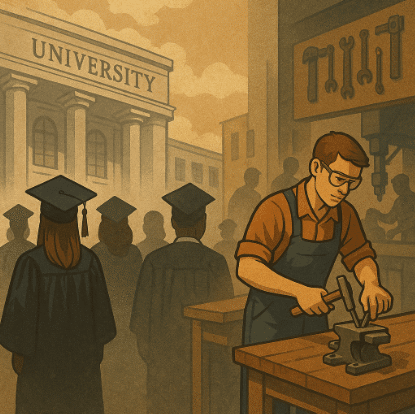
Trust Is Earned, Not Assumed: Why Republicans and Democrats Have Good Reason to Question the Fed and Financial Media
In a time when the American people are more divided than ever, there’s one thing most of us can agree on: trust is in short supply. For many of us on the right, that mistrust isn’t irrational—it’s earned. We’ve watched unelected bureaucrats like those at the Federal Reserve exert enormous influence over our economy while refusing to answer tough questions. Meanwhile, the so-called “mainstream” financial media treats conservative concerns like conspiracy theories and liberal assumptions like gospel.
But let’s be clear: this isn’t about rejecting expertise—it’s about demanding accountability.
The Federal Reserve’s Political Fog
On paper, the Federal Reserve is supposed to be an independent steward of the economy. In reality, its credibility is slipping, and Americans across the aisle can feel it. According to a study by the Becker Friedman Institute, two-thirds of Democrats think the Fed favors Republicans, while 60% of Republicans believe it favors Democrats.
That’s not just irony—it’s a warning sign. When everyone thinks the Fed is playing favorites, maybe the problem isn’t our perceptions. Maybe the Fed has stopped acting like a neutral referee and started playing politics behind closed doors.
Republicans have long advocated for greater transparency and accountability from the Federal Reserve. That’s not “anti-science” or “anti-institution”—it’s pro-responsibility. If we’re going to let unelected economists set interest rates and steer inflation policy, the least they can do is show their work and stop pretending they’re above politics.
Media Bias Is Not a Myth—It’s a Market Strategy
Then there’s the media. Too often, financial reporting sounds like a press release from the DNC. Whether it’s soft-pedaling under Democratic administrations or treating Republican-led policies with cynicism and suspicion, the trend is clear. A study referenced by PsyPost found that media coverage of economic conditions is far more favorable when Democrats hold the White House. That doesn’t just skew the narrative—it skews public expectations, consumer behavior, and ultimately, policy itself.
Let’s be fair: media bias isn’t always intentional. But it is real. And when Republican voters see their concerns dismissed or caricatured by financial “experts,” it’s no wonder trust collapses.
This is why conservative media matters. It’s not just about ideology—it’s about balance. If the only economic analysis getting airtime is shaped by progressive assumptions, we’re not having a national conversation—we’re enduring a monologue.
Skepticism Isn’t Cynicism—It’s Citizenship
At the end of the day, questioning the Fed and the financial press isn’t about burning it all down. It’s about refusing to be passive consumers of information. Americans—on the right and the left—deserve institutions that work for the people, not above them.
Yes, partisan distrust can slow down policy and increase uncertainty. But there’s a deeper danger in blind trust—especially when it’s placed in institutions that have failed to earn it. If the price of a more informed democracy is a little more questioning, a little more scrutiny, then so be it.
Let’s not confuse unity with uniformity. Republicans can disagree—respectfully—with our Democratic neighbors while still insisting on integrity from the economic gatekeepers who shape our lives.
Bottom Line:
Americans are right to be skeptical. The Federal Reserve doesn’t get a free pass. Neither does the media. If we want a future where the economy serves all Americans, not just the elites, we need transparency, balance, and accountability. Let’s stay principled—and vocal—about demanding it.











